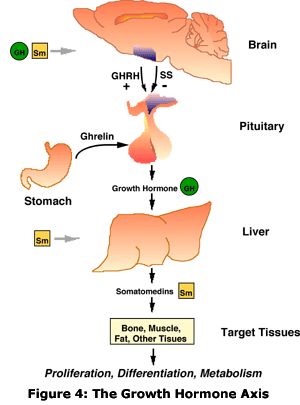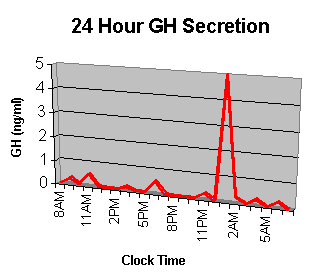What is growth hormone?
Growth hormone (GH), also known as somatotropin, is an anabolic hormone made and secreted by the pituitary gland.GH is a large polypeptide thought to encourage growth indirectly by stimulating the release of growth factors from the liver and muscle (e.g., IGF-1).
These growth factors create the cascade of events typically associated with higher GH concentrations. GH is released in response to growth hormone releasing hormone (GHRH) produced by the hypothalamus.

Why is growth hormone so important?
GH helps bone, muscle, and other tissues grow.In the muscle, GH stimulates protein synthesis as well as fat metabolism. GH recruits fatty acids from storage and tells the body to use fatty acids for energy.
Interestingly, as GH limits the storage of fats and mobilizes them for energy, blood sugar levels concurrently increase. In this way, GH “spares” carbohydrates from breakdown, and the level of sugar in the blood increases. This is why long-term GH replacement may predispose one to insulin resistance.
The effects of GH on fat mobilization can begin at 20 minutes after release and last up to 3 hours.
You may wonder why intense exercise is so effective at helping you lose fat, even though it doesn’t seem like a few sets of heavy squats would burn that many calories. Many researchers credit the concomitant appearance of high concentrations of plasma fatty acids and GH that follow intense training.
GH also:
- Decreases blood sugar utilization
- Decreases glycogen synthesis
- Increases amino acid transport into cells and protein synthesis
- Increases fat breakdown and utilization
- Increases collagen synthesis and cartilage growth
- Increases retention of nitrogen, sodium, potassium, and phosphorus
- Increases kidney flow and filtration
- Enhances immune function
What you should know
The reference range for healthy GH levels is 0.06 – 8.0 ng/mL.When someone is GH deficient, GH replacement seems to be safe and may even promote health – at least with long-term monitoring by a physician. There seems to be a mild risk of insulin resistance.
Sleep and GH
Sleep is associated with the release of hormones such as GH. This may be why sleep helps us repair and recover. Sleep associated GH secretion has also been linked to the nocturnal rise in fatty acid release.As one ages, there is a decrease in sleep duration and GH secretion. Sleep deprivation in young individuals reduces GH secretion and may contribute to premature development of the metabolic syndrome. As you can see in the diagram below, GH secretion peaks late at night.

Exercise and GH
The secretion of GH during and after exercise is proportional to intensity. The tougher and harder the exercise, the more GH is released. Think sprints instead of long slow distance runs.Increases in GH secretion are related to increases in acids, by-products of high intensity exercise. Also, catecholamines may stimulate GH secretion. Rest periods of 60 seconds or less can help stimulate GH release.
GH slowly rises during an intense workout, but it actually peaks only when the workout is over. Thus, the peak GH release concurs with the maximal fatty acid release from fat tissue. Exercise also appears to increase the amplitude and number of GH pulses during the day.
Reducing calorie intake doesn’t seem to create a GH deficit. Data indicate that cutting calorie intake by 25% doesn’t significantly reduce GH levels, and people who exercise with the right type of training may actually see GH increase.
Summary and recommendations
To ensure healthy growth hormone levels:- Exercise intensely, using many muscle groups
- Exercise with multiple sets, short rest periods (<60 seconds) and heavy weight (~10 rep max)
- Ensure adequate carbohydrate and protein consumption before and after workouts
- Avoid/limit alcohol consumption
- Get 7-9 hours of sleep each night
- Maintain a lean/healthy body composition
Further resources
All About SleepMinutemen
The Fountain Of GH